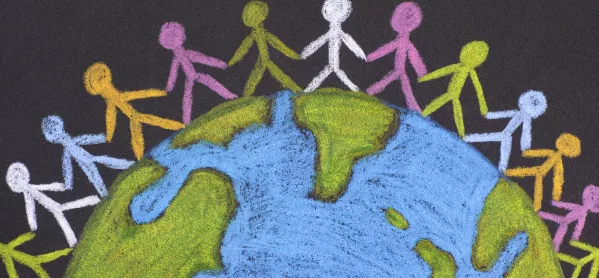- Home
- How the UN’s Global Goals can engage pupils
How the UN’s Global Goals can engage pupils

Back in 2015, my colleagues at the Nord Anglia Education team asked my opinion about our group of international schools working with Unicef to promote the newly formed Sustainable Development Goals - or Global Goals - to our students around the world.
At the time I was sceptical: yes, this was a worthy aim but would students really be engaged by dry terms such as “sustainable development” and complex UN targets?
Five years on and I can honestly say that teaching the SDGs is the most exciting and important area I have ever worked on and it has had a huge impact on how our students understand the world and their place in it.
Global lessons
Central to this has been the Project Everyone: World’s Largest Lesson scheme and the lesson resources that are released annually in Global Goals Week (which takes place from 19 to 26 September this year).
The World’s Largest Lesson seems to have an uncanny ability to engage students in issues before they hit the headlines.
For example, in 2016, actor Emma Watson launched the From Where I Stand project examining gender equality in our communities, so students were well versed in debates around these issues when the #metoo stories hit the headlines a few months later.
What was more inspiring was that students took these topics to heart, clearly having their own conversations around the questions raised.
Students led heated debates about gender issues, including the fracas at the heart of the UN when Wonder Woman was named an ambassador.
Like many in the UN itself, a clear majority of students decided that this was condescending and voted with their feet, preferring to watch the film Suffragette over the DC Comics movie as an end-of-term treat.
Food for thoughts
The 2017 topic Every Plate Tells a Story invited students to explore the connections between the food we eat and the goals.
We were fortunate to invite Livin Farms, a Hong Kong-based start-up, to deliver an assembly exploring insect-eating as an alternative, eco-friendly protein source. Students were fascinated by the idea and some added the desktop mealworm farms to their Christmas lists as a result.
A related project led a group of students to raise the topic of the smuggling and consumption of endangered species, a huge issue in Hong Kong, which is one of the hubs of the shark fin trade.
Students focused in on the pangolin, the world’s most trafficked creature, and we were shocked to discover that at least eight students had been present when the creature’s meat was served.
When they learned of the scaly mammal’s plight, they all pledged to spread the message that this practice is illegal and unethical.
Saving the planet
And in 2018, under the topic Everyone can be a Goalkeeper, our students learned about a wide range of inspirational young people from all over the planet who are taking steps to reach the goals.
Furthermore, this pool will continue to grow with the annual Gates Foundation’s Goalkeepers Awards.
Ultimately, the great thing about the World’s Largest Lesson is that it helps students to collaborate and take action for the SDGs in a way that feels meaningful.
For example, our student council has put the goals at the heart of its agenda and uses them as a starting point to taking action.
Calls to action
As a result, we have established Meat Free Mondays in the school canteen, invited groups such as Roots and Shoots, Plastic Free Seas and the UNHCR, the UN refugee agency, to speak in school assemblies, and created eco-friendly bamboo straws and reusable silk bags to share with our school community.
As such, for any school that wants to empower their students to see themselves as global citizens, I highly recommended getting involved in the World’s Largest Lessons and/or using the SDGs to facilitate discussions among students.
Lastly, one of the many well-known advocates for the goals was Sir Ken Robinson, who sadly passed away recently. Sir Ken’s hope for school leaders and teachers was that:
“If every school in the world teaches children about these global goals, we will help them become the generation that changed the world.”
It would be wonderful if his goal was reached with your help.
5 free resources to help you teach the global goals
1. The Microsoft Educator Centre offers a free one-hour course in teaching the SDGs, including a badge and certificate for completion. Follow that by joining the Teach SDGs community.
2. All the World’s Largest Lesson topics are available for free, including lesson plans for this year’s topic focused on Climate Action. Watch out for a new film and more lessons plans in the run-up to Global Goals Week (19 to 26 September).
3. The Goals have a great many celebrity supporters, who can be spotted in the many videos on the Youtube channel. Students from mainland China might be interested in the Running Man TV episode featuring superstars Lu Han and Angela ‘Baby’ showing their support for the goals. My students’ favourite is the clip with the Pen Pineapple guy.
4. Younger learners may enjoy a free Global Goals Boardgame, SDG paper chains to decorate your classroom, a family activity pack for colouring and a whole set of picture books, all available for free download.
5. Older students may be engaged by this pack, which includes some great detailed posters about each goal and a multilingual booklet with 170 daily actions to transform our world.
David Robinson is an English and humanities teacher at Nord Anglia International School in Hong Kong. He has taught internationally for 14 years
Keep reading for just £1 per month
You've reached your limit of free articles this month. Subscribe for £1 per month for three months and get:
- Unlimited access to all Tes magazine content
- Exclusive subscriber-only stories
- Award-winning email newsletters



